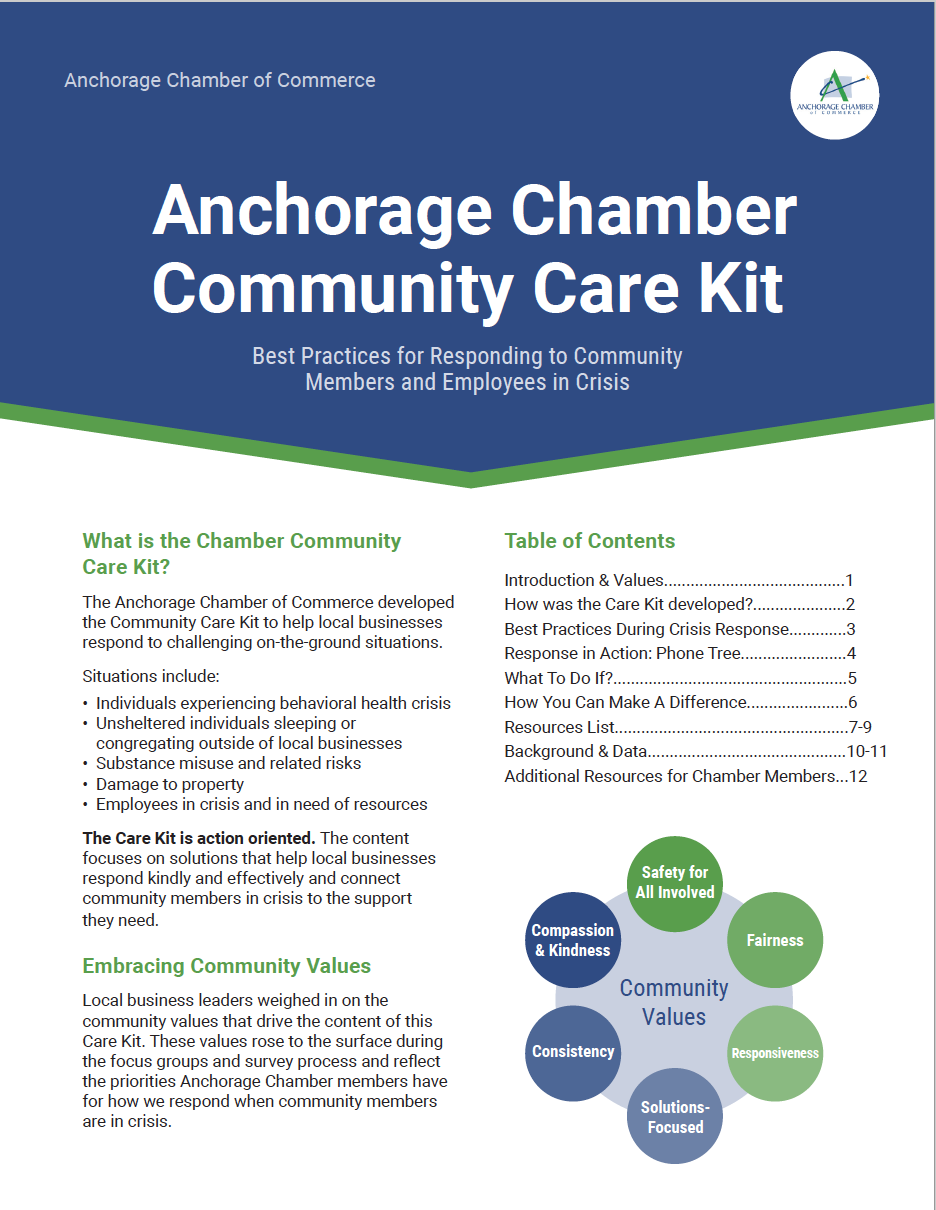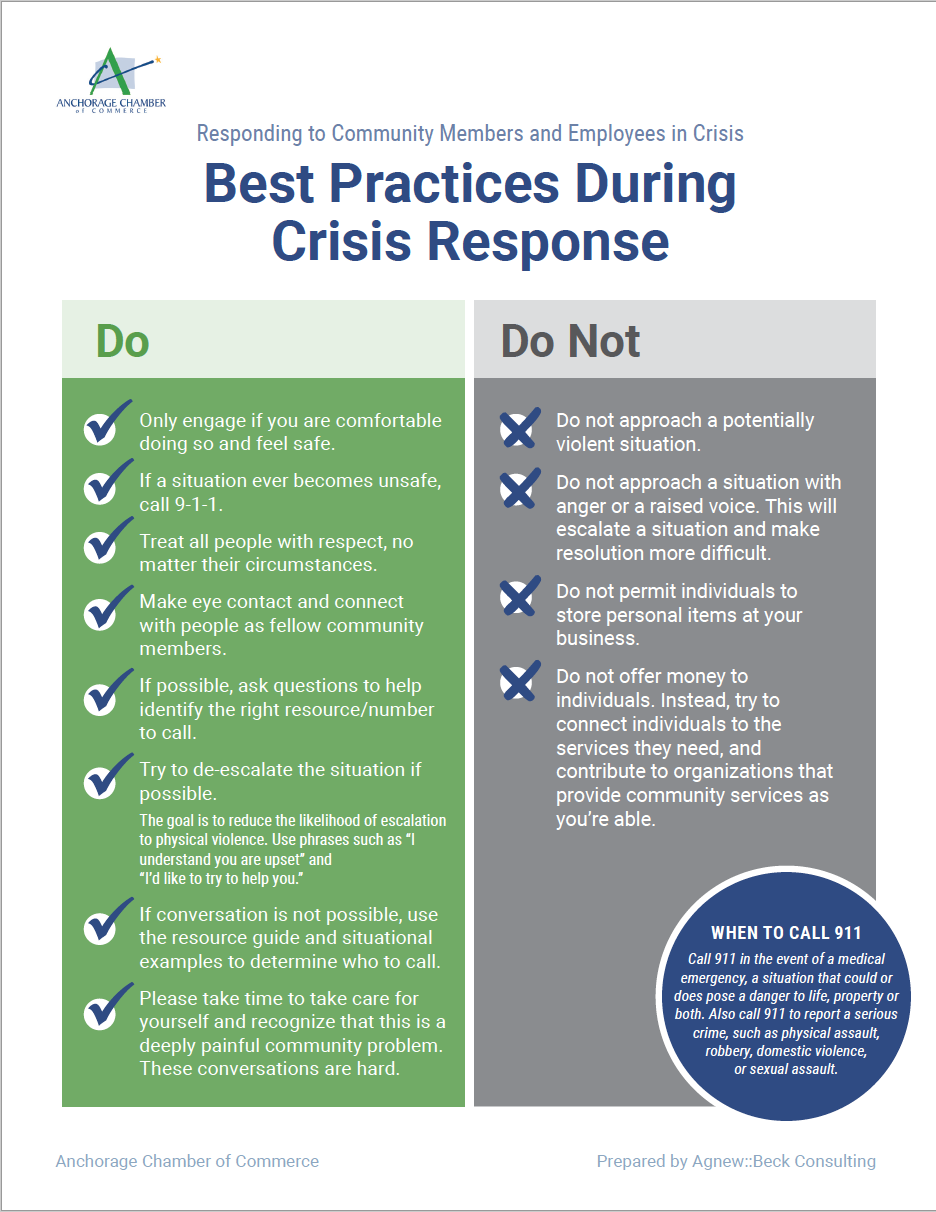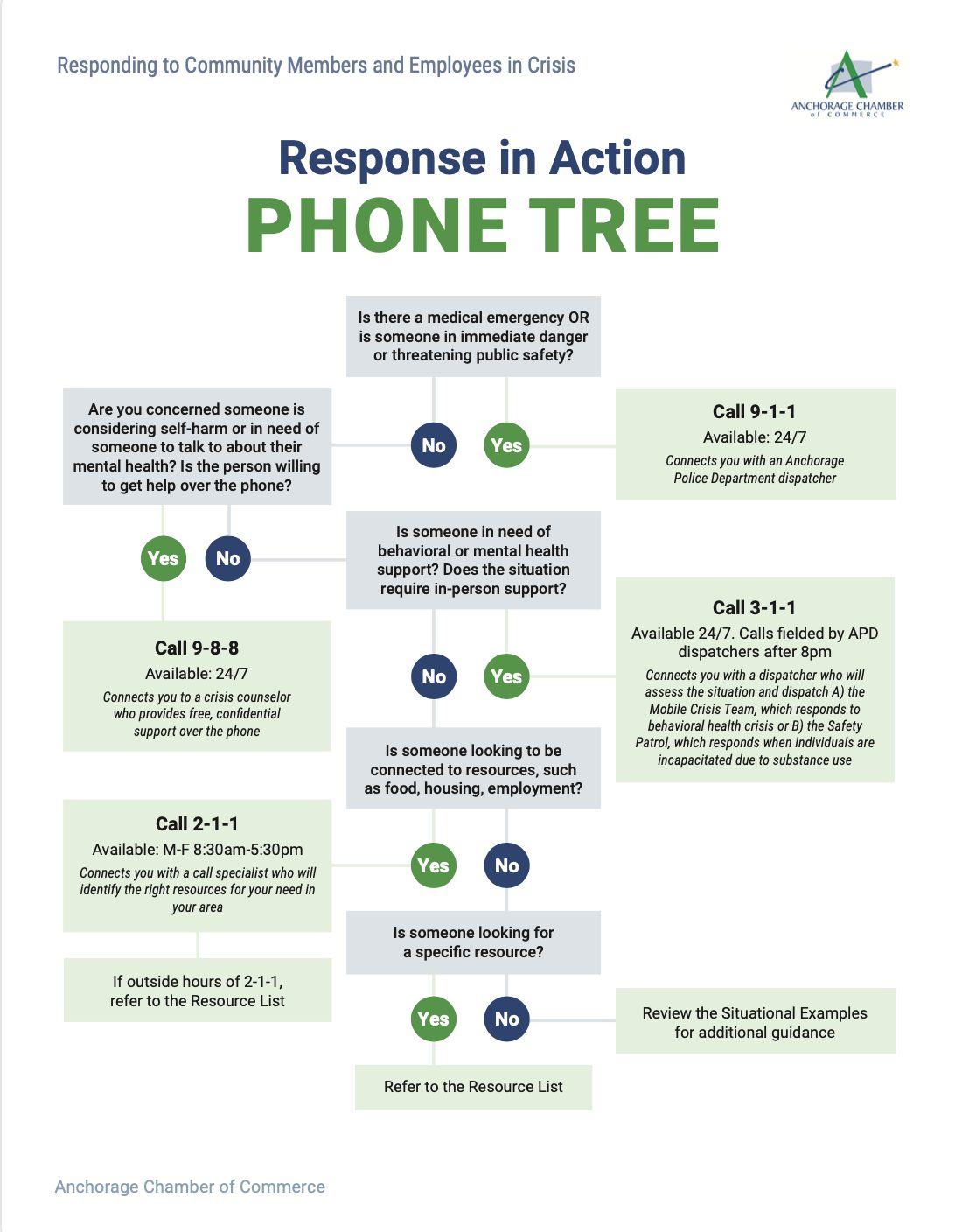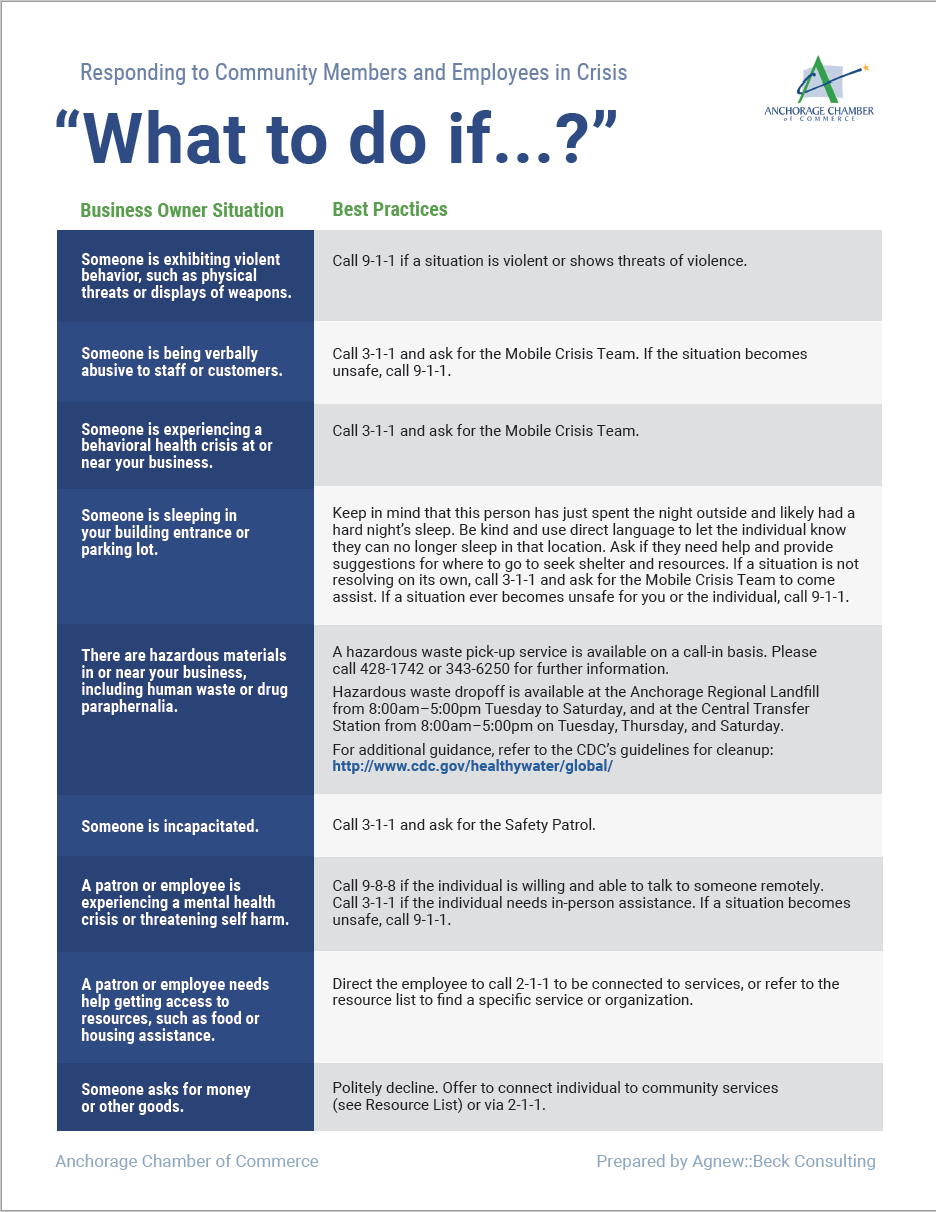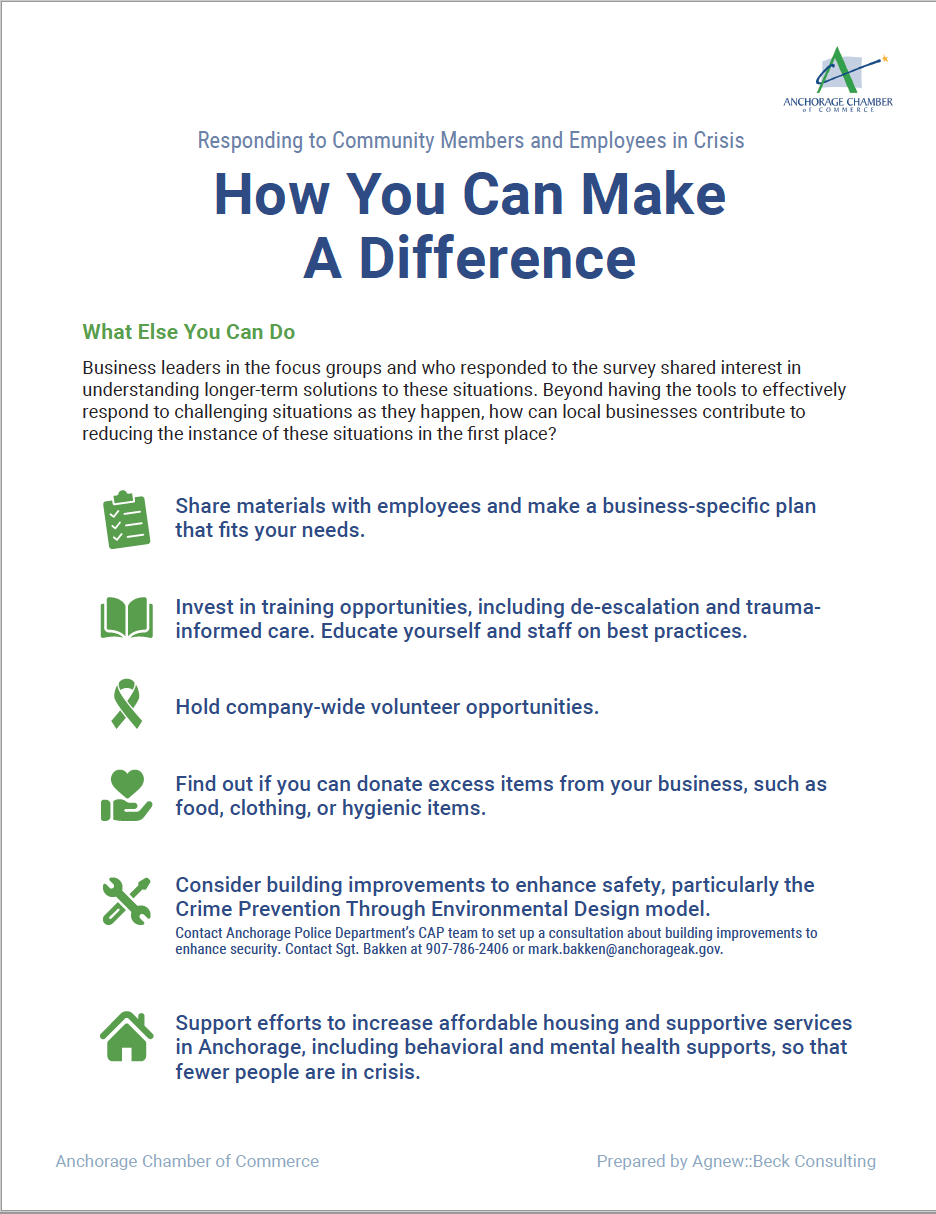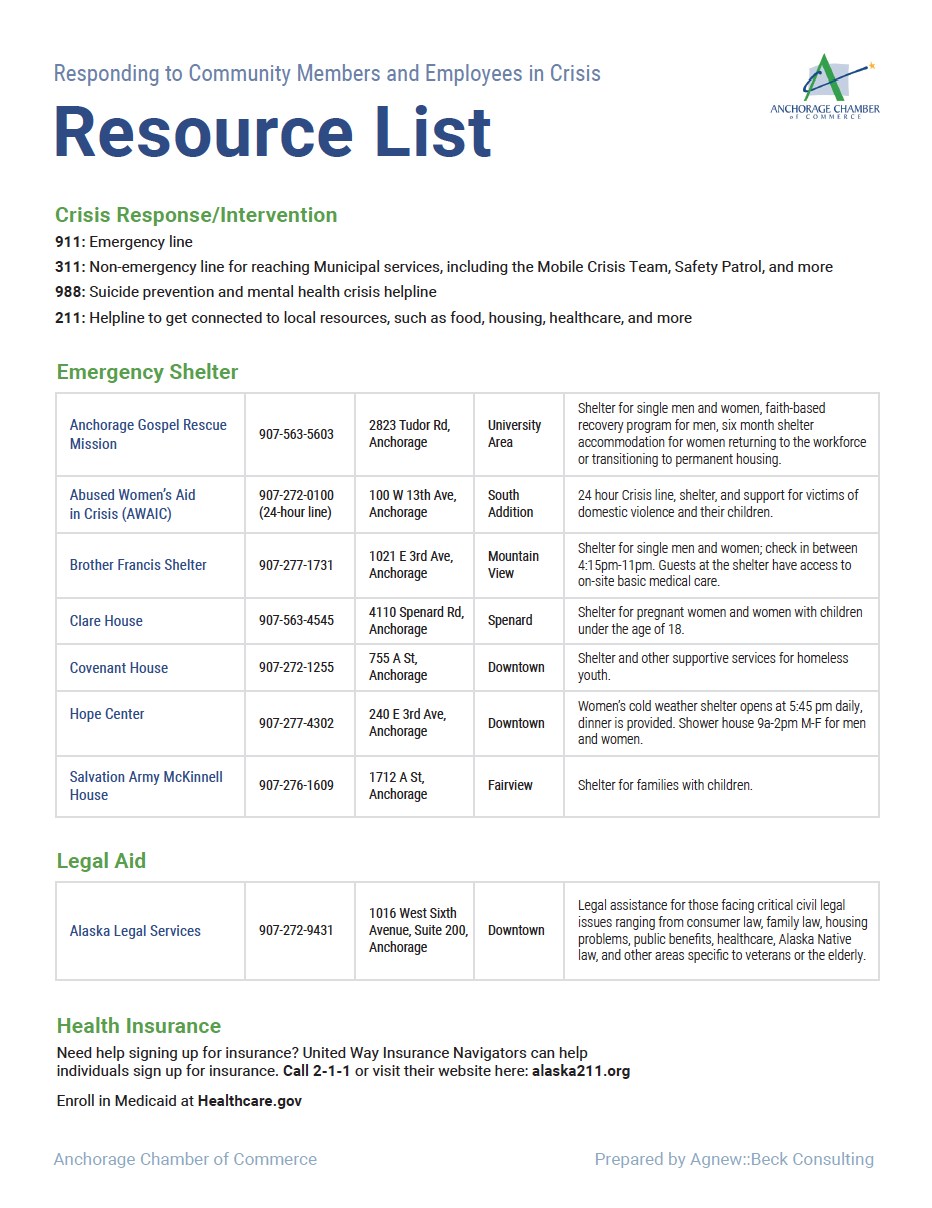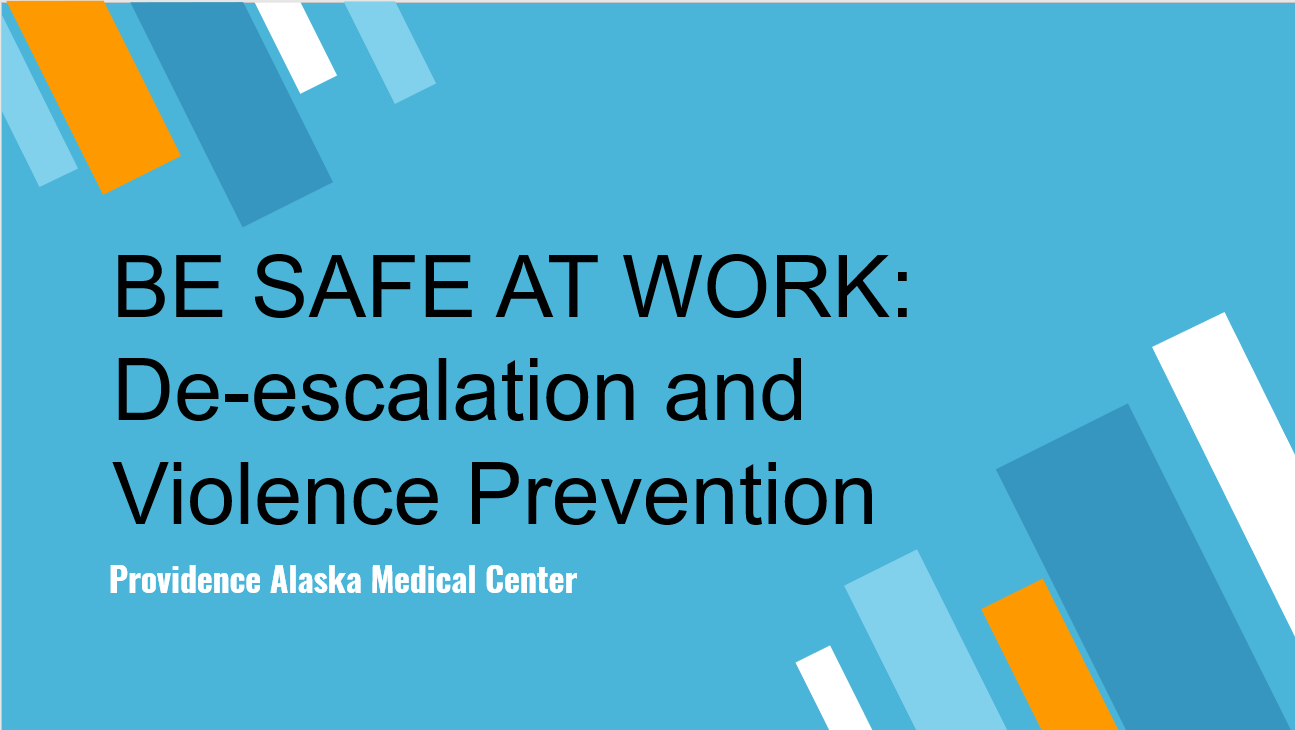Community Care Kit
Anchorage Chamber Community Care Kit
Over the past few years, the Chamber has heard increasing reports from businesses small and large that they are experiencing situations with community members in crisis, including employees. With the start of COVID, we know that frontline workers at our local businesses became more responsible for handling stressful situations with individuals in crisis and not knowing who to call or what to do. At the same time, these employees were often finding themselves more in need of help and resources themselves.
Businesses across the community have been grappling with how to respond effectively and compassionately to situations where someone is in crisis or in need of help – from individuals sleeping outside or in front of businesses to substance misuse and related risks to individuals asking for food or other resources to people experiencing behavioral health crises.
The Chamber heard businesses loud and clear, and partnered with Agnew::Beck Consulting to develop a toolkit to help local businesses respond to these challenging on-the-ground situations. This work has taken place thanks to a grant from the Rasmuson Foundation.
We know that this toolkit will not solve the complex issues contributing to crises, but it can be a helpful resource for businesses and the community more broadly.
The toolkit is informed by best practices and community voices: from business owners to experts in crisis response. Feedback came via:
- An advisory team of service providers, businesses, and community members
- Focus groups of business owners and employees, attended by over 30 local businesses
- An online survey of local businesses about their experiences and goals for a toolkit, which received 132 responses
- Direct feedback on the toolkit from experts in crisis response, from APD to Crisis Now.
The project team also reviewed existing toolkits from other communities around the country to create an outline and inform this localized toolkit.
The result is the Anchorage Chamber Community Care Kit: Best Practices for Responding to Community Members and Employees in Crisis.
Testimonials
"I attended the Make it Monday forum yesterday for the first time. I didn’t know really what to expect as it was the first networking event and first chamber event I’ve been to. It was a very informative and great event and I plan on going to another in the future. However, I wanted to say thank you specifically for the community care packet. Yesterday after the event we had a man come into the bank asking for helping contacting the mobile crisis team and I was able to help him out after he was turned away at 4 other places and the SOLE reason I was able to do so was because the information I learned from the event and the care kit itself. So, I was just wanted to reach out and say thank you and what you guys are doing is truly making a difference."
- Hunter Robertson, Northrim Bank
"Thank you so much for creating and sharing the Community Care Kit! The Community Care Kit will have an immediate, tangible impact through use of Stone Soup Group employees in the Anchorage office, as the weather warms and people spend more time outdoors in Anchorage. You provided us ready tools to give compassionate, safe help to people in crisis."
- Alyssa Rose-Miller Parent Navigator, Stone Soup Group
“The Community Care Kit is an excellent resource that I highly recommend to all Anchorage business owners."
-Dave Bronson, Mayor of Anchorage
Background on the Issues
We know anecdotally that many of our community members and neighbors are in crisis. Through this project we have also collected data, including direct reports from local businesses, that start to tell us the scope of the issues that businesses and community members are experiencing.
What we heard from businesses
- 73 percent of businesses that responded to the survey (96 out of 132) have been directly impacted by challenging situations with community members in crisis.
- Of those businesses, a majority have experienced several direct impacts.
- The most common experiences (from most to least common) of businesses that experienced impacts include:
- Property damage (67%)
- Operational impacts (61%)
- Financial impacts (60%)
- Safety concerns (60%)
- Health and safety impacts (51%)
- Customer complaints (48%)
Secondary data
Homelessness & sleeping outside:
- Almost 9,000 unique individuals who experienced homelessness accessed services in Anchorage between January and August of 2022.1
- Over 3,000 of these individuals used emergency overnight shelter.2
- In September of 2022, approximately 350 individuals were experiencing unsheltered homelessness and sleeping outside in Anchorage
- 19 percent of people experiencing homelessness in Anchorage in 2022—or 1,710 individuals—are chronically homeless, meaning they have experienced homelessness for at least a year, or have had repeated episodes of homelessness.
Behavioral health:
- The state’s Mental Health Agency served almost 23,000 individuals in 2020. Over 21,000 individuals were served in community settings, while 453 individuals were served in state psychiatric hospitals.
- Alcohol is the substance of highest use and misuse in Anchorage, representing the greatest share of substance-induced deaths.5
Crime
- Property crime rates are down from recent peaks in 2019, including for burglary, DUI, stolen vehicle, and theft. Rates of vandalism have increased since 2021, reaching their previous 2019 rate.6
- Rates of assault and sexual assault have both increased since 2021, but have not returned to their 2019 highs. Rates of robbery have continued to decrease.
What’s in the Community Care Kit
The Community Care Kit is an action-oriented toolkit of resources. The content focuses on solutions that help local businesses respond kindly and effectively and connect community members in crisis to the support they need.
The Community Care Kit is driven by a series of values identified during the process:
- Safety for all involved
- Compassion & kindness
- Responsiveness
- Fairness & consistency
- Solutions-focused
Chamber Academy Recording
Community Care Kit Training
De-escalation and Violence Prevention Training by Lauren Anderson of Providence Alaska Medical Center starts at about the 12-minute mark WATCH
The Care Kit is split up into action-oriented sections, based on what we heard businesses ask for:
- Best Practices During Crisis Response (DOWNLOAD PDF)
- This section shares high-level tips on what to do or don’t do when responding to a crisis situation, from how to maintain safety and respect to how to avoid escalating a situation.
- Phone Tree (DOWNLOAD PDF)
- From 911 to 311 to 211, navigating the various resource lines can be confusing. The phone tree is an actionable decision-tree for businesses and staff to determine what number to call based on the situation at hand and what information is needed.
- Situational Examples (“What to do if…”) (DOWNLOAD PDF)
- The situational examples provide additional guidance on what to do in some of the commonly experienced situations businesses shared – from what to do when someone is sleeping in a business entrance to what to do when someone is experiencing a mental health crisis to what to do when someone is asking for food or shelter.
- Resource List (DOWNLOAD PDF)
- The resource list provides direct contact information for additional resources that someone might be looking for, whether legal aid or emergency shelter.
- How Businesses Can Make a Difference (DOWNLOAD PDF)
- Finally, the Community Care Kit shares additional ways for local businesses to prepare and to make a difference, from building improvements that can enhance safety to ideas for staff training and volunteer opportunities.
- This section goes beyond response to talk about prevention.
What Comes Next / Using the Care Kit
The Community Care Kit is meant for on-the-ground use. It can be downloaded and shared as a single pdf, or each section can be downloaded as a separate poster to be printed and hung up in your business, and/or shared with staff.
The Community Care Kit can start a conversation: Many businesses and organizations in our community are grappling with how to help community members in crisis, including employees. The Care Kit can be shared with staff as a way to start an internal conversation about best practices and organization-specific responses. It can also be a way to share resources with employees who might be in crisis or in need of resources.
The Community Care Kit is for all of us: The Community Care Kit is borne out of what we heard from local businesses, but we know that these are issues affecting all of us. We also know that Anchorage is strongest when we come together, and this action-oriented resource is meant to be used by all of us – whether you’re looking for resources or looking to help someone else get connected to them.
Next steps for the Community Care Kit include:
- Public launch of the Community Care Kit
- Meetings with key stakeholder groups, including business groups and service providers
- Vetting of additional opportunities to share the toolkit and best practices in crisis response through training opportunities for business owners and staff
